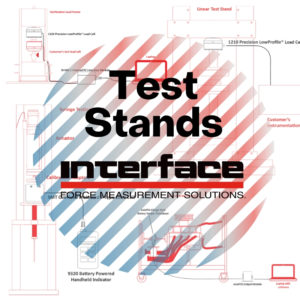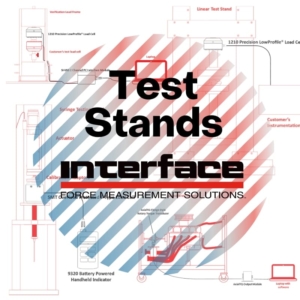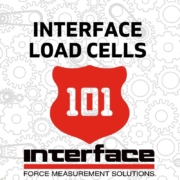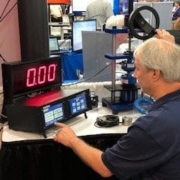Test Stand Applications for Force and Torque
 Test stands are essential equipment for manufacturers and testing engineers in the world of test and measurement. The test stand provides various testing products in a single “cabinet-like” structure. These systems have been used for a long time to gather data on various functions of products during the product test phase.
Test stands are essential equipment for manufacturers and testing engineers in the world of test and measurement. The test stand provides various testing products in a single “cabinet-like” structure. These systems have been used for a long time to gather data on various functions of products during the product test phase.
Test stands work like a mobile test lab, hosted by a frame and containing one or more force or torque sensor components, software, data acquisition instrumentation and accessories. Force stands are typically motorized or manual. Motorized test stands, also known as mechanical or electrical, have the advantage of controlling performance by applying modes such as speed, cycles, and time into the testing procedure. The more advanced testing stands are frequently used for repetitive high-performance testing requirements, validating accuracy and quality. Manual test stands are used for simple testing protocols and are frequently used in education programs.
A wide variety of testing devices and sensor products are used throughout the test process. As parts roll off the production line, the test stand will sit at the end of the line, where the test engineer can immediately load the product into the test rig. Test stands help to streamline the test process by providing all available test functions in a single mobile application.
Interface is a supplier of choice for precision components of various capacities and dimensions for test stand configurations requiring precision and accuracy in performance. Interface load cells, torque transducers, and instrumentation equipment are commonly used in numerous product test applications by engineers, metrologists, testing professionals, and product designers worldwide.
Below are a few examples of specific test applications and the Interface components used in the different-style testing stands.
Linear Test Stand
In this example, an Interface customer wanted to add a crush test to their test stand to measure the force it took to deform a piece of material. Interface provided a Model 1210 Load Cell with an internal amplification of 0-10VDC output.
The load cell was installed into the load string of the customer’s load frame, and the scaled analog output from the load cell was connected to the customer’s test stand instrumentation. When the force levels reached the crushing point, the customer’s software could read the output of the amplified load cell and record the value.
See the application note for the Linear Test Stand here.
Motor Test Stand
In the quality control lab at a major automotive manufacturing company, a test engineer needed to test, record, and audit the torque produced by a new motor design under start load. Interface supplied the new AxialTQ® Rotary Torque Transducer, which connected between the motor and the differential on the drive shaft, and could measure and record these torque values.
Based on the data collected using the AxialTQ transducer, the AxialTQ Output Module, and a laptop, the test engineer made recommendations to optimize the amount of torque created by the new motor design.
See the application note for the Motor Test Stand here.
 Verification Test Stand
Verification Test Stand
In this application, a customer needed a test stand application to verify that its load cell was in good working order. Interface helped to create a solution that used a load cell to verify the customer’s load cell. The solution involved the customer’s supplied verification load frame and an Interface Model 1210 Precision LowProfile® Load Cell connected with a Model SI-USB 2-Channel PC Interface Module.
The customer installed their Model 1210 Precision LowProfile Load cell into the verification load frame. Model SI-USB PC Interface Module displayed and recorded applied forces for review and record keeping on the customer’s computer. This allows the customer to have a proven load cell verification test stand at their disposal to ensure its test load cell is always in working order.
See the application note for the Verification Test Stand here.
These are just a few examples of the different types of test stands that Interface can provide off-the-shelf or custom force measurement solution components. If your project involves a mechanical test stand and you want to learn more about adding force sensors, please contact our application engineers.








